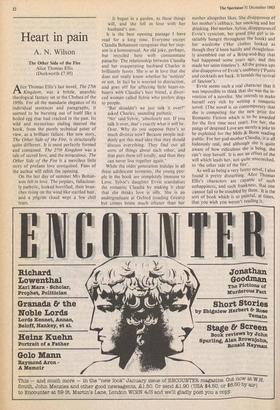Heart in pain
A. N. Wilson
The Other Side of the Fire Alice Thomas Ellis (Duckworth £7.95)
Rice Thomas Ellis's last novel, The 27th Kingdom, was a brittle, anarchic theological fantasy set in the Chelsea of the 1950s. For all the mandarin elegance of its individual sentences and paragraphs, it seemed to be bursting out of itself like a boiled egg that had cracked in the pan. Its wild and mysterious ending marred the book, from the purely technical point of view, as a brilliant failure. Her new story, The Other Side of the Fire, is structurally quite different. It is most perfectly formed and contained. The 27th Kingdom was a tale of sacred love, and the miraculous. The Other Side of the Fire is a merciless little story of profane love unrequited. Fans of the author will relish the opening.
On the last day of summer Mrs Bohan- non fell in love. The poplars, fallacious- ly pathetic, looked horrified, their bran- ches rising on the wind like startled hair, and a pilgrim cloud wept a few chill tears. It began in a garden, as these things will, and she fell in love with her husband's son.
It is the best opening passage I have read for a long time. Everyone except Claudia Bohannon recognises that her step- son is a homosexual. An old joke, perhaps, but recycled here with consummate panache. The relationship between Claudia and her exasperating husband Charles is brilliantly funny. She is so in love that she does not really know whether he 'notices' or not. In fact he is worried to distraction, and goes off for affecting little heart-to- hearts with Claudia's best friend, a divor- ced woman called Sylvie who prefers dogs to people.
`But shouldn't we just talk it over?' asked Charles, sounding pathetic.
'No' said Sylvie, 'absolutely not. If you talk it over, that's exactly what it will be. Over. Why do you suppose there's so much divorce now? Because people sud- denly got this mad idea that they should discuss everything. They find out all sorts of things about each other, and that puts them off totally, and then they can never live together again.'
While the older generation indulge in all these adolescent torments, the young peo- ple in the book are completely immune to Love. Sylvie's daughter Evvie scandalises the romantic Claudia by making it clear that she thinks love is silly. She is an undergraduate at Oxford (reading Greats) but comes home much oftener than her
mother altogether likes. She disapproves of her mother's celibacy, her smoking and her drinking. Her mother, Sylvie, disapproves of Evvie's cynicism, her greed (the girl is in- satiably hungry throughout the book) and her wardrobe ('Her clothes looked as though they'd been hastily and thoughtless- ly assembled out of a Bring-and-Buy that had happened some years ago, and this made her seem timeless'). All the grown ups also disapprove of Evvie's snobbery (Punts and cocktails are back. It heralds the revival of fascism').
Evvie seems such a real character that it was impossible to think that she was the in- vention of a novelist. She intends to make herself very rich by writing a romantic novel. (The novel is so contemporary that she is competing for the new prize for Romantic Fiction which is to be awarded for the first time next year). For her, the pangs of despised Love are merely a joke to be exploited for the Mills & Boon reading public. For her god-mother Claudia, it is all hideously real, and although is is quite aware of how ridiculous she Is being, she can't stop herself. It is not an effort of the will which leads her, not quite unscorched, to 'the other side of the fire'.
As well as being a very funny novel, I also found it pretty disturbing. Alice Thomas Ellis's characters are capable of such unhappiness, and such frankness, that one cannot fail to be troubled by them. It is the sort of book which is so painful, at times, that you wish you weren't reading it.














































 Previous page
Previous page